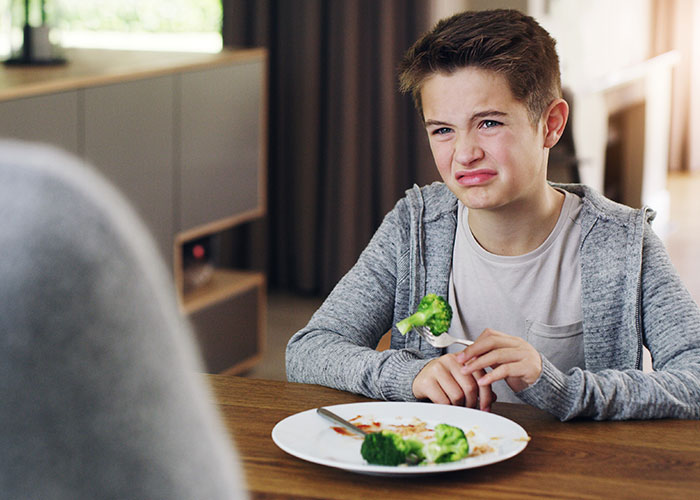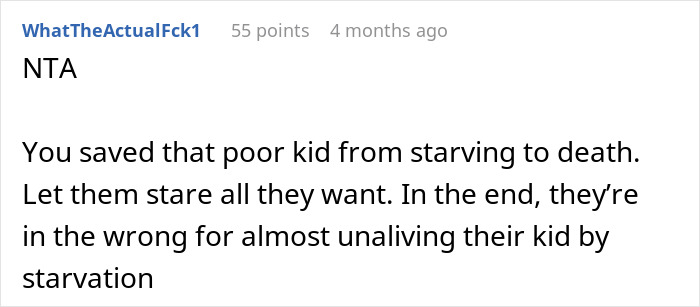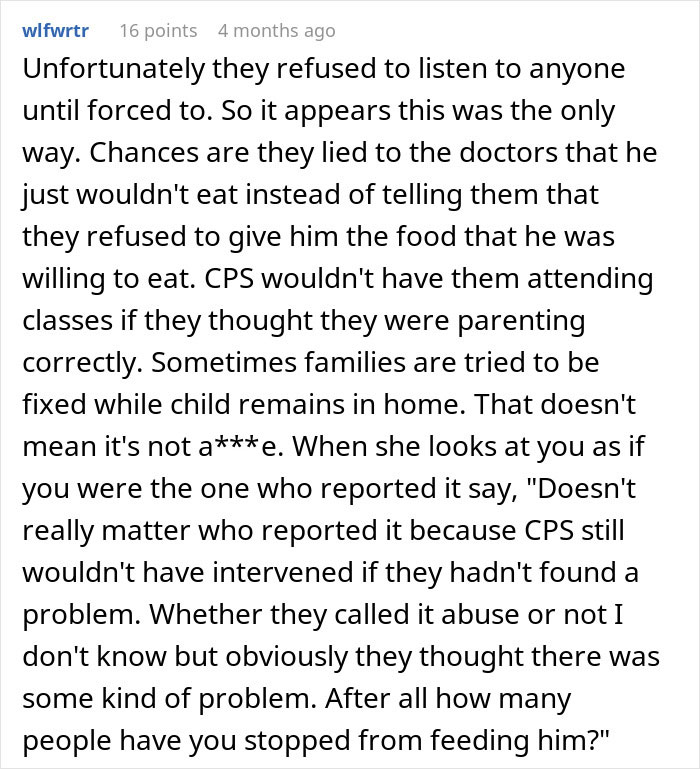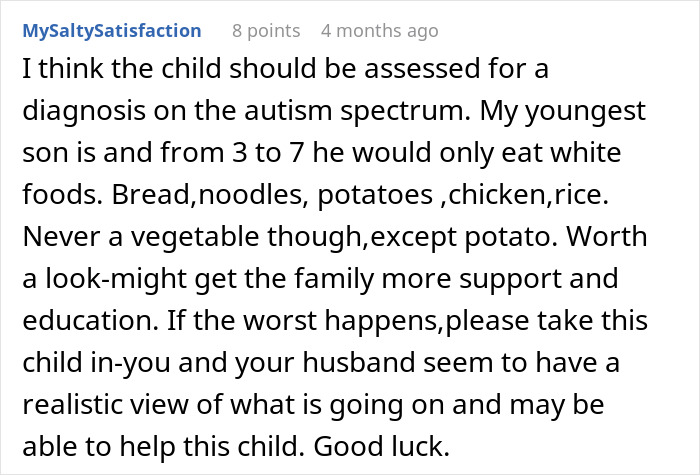
“They Don’t Know It Was Us”: Kid Gets Hospitalized After An Anonymous Report To CPS
Interview With ExpertIt’s very common for kids to be slightly fussy about their food, as some might be more sensitive to taste, smell, or textures. However, if their aversion to eating or trying new foods results in undernourishment and starts limiting their lives, it can become a serious problem.
One that these parents faced but refused to accept. So instead of getting the help their kid needed, they tried taking away the foods he liked in hopes he would start eating other things. After numerous hospitalizations due to not enough nourishment, their in-laws decided to do something about it and reported them to CPS, which, well, caused quite the stir-up.
Scroll down to find the full story and conversation with board-certified specialist in pediatric nutrition Tok-Hui Yeap, pediatric occupational therapist and feeding specialist Marielle Marquez, and registered dietitian Dima Salhoobi, who kindly agreed to share their insights on fussy eaters.
Sometimes, picky eating can be a sign of a bigger problem
Image credits: The Yuri Arcurs Collection / freepik (not the actual photo)
As it happened with this family, who had many difficulties dealing with it, leading to CPS report
Image credits: wavebreakmedia_micro / freepik (not the actual photo)
Image credits: Ok_Repeat_8017
One in four 1.5-year-olds and 3-year-olds are picky eaters
Image credits: Tamara Kirsanova / freepik (not the actual photo)
Many children go through a phase of picky or fussy eating. It’s a natural stage of development that usually appears between 1.5 and 2 years of age. In fact, a study of 4,000 children found that one in four 1.5-year-olds and 3-year-olds were picky eaters.
“Picky eating can be a normal phase for many toddlers and young children. If they are particular about which foods they are willing to eat but still eat a wide enough variety that their nutritional needs can be met, I wouldn’t be concerned,” says pediatric occupational therapist and feeding specialist Marielle Marquez.
For some children, this phase passes on its own if parents handle it in a supportive and encouraging way. However, for others, picky eating can linger and peak at ages 7 to 8 or even be a sign of a bigger issue.
“While some food selectivity is normal in early childhood, persistent picky eating can lead to nutrient deficiencies, poor growth, and even ARFID. Research shows that children with extreme food aversions are at higher risk for academic struggles, fatigue, and frequent school absences due to inadequate nutrition. Early intervention is key—don’t wait for picky eating to escalate,” warns registered dietitian Dima Salhoobi.
Something that’s important to keep in mind is that picky eating and ARFID are two different conditions and shouldn’t be grouped together.
“Children who are average picky eaters will often grow out of their pickiness as they get older or when parents provide a positive feeding environment. However, children with ARFID will need a team of feeding experts and psychologists to help address their underlying issues, whether they stem from medical conditions, psychological trauma, sensory sensitivities, aversions or lack of interest in eating,” explains board-certified specialist in pediatric nutrition Tok-Hui Yeap.
“Parents should try to maintain a relaxed atmosphere around mealtimes”
Image credits: EyeEm / freepik (not the actual photo)
Most of the time, it’s not the parents’ fault that a child is diagnosed with ARFID, as almost 80% of a person’s chances of having ARFID come from genetic makeup. That said, children’s environment can contribute to it, but it has much less influence than the genes a person is born with.
“ARFID is an eating disorder that is associated mostly with psychological fear of consequences/anxiety (example: fear of choking, throwing up or physical abuse), sensory aversions (sensory processing disorders, can’t stand chewing sounds or can’t stand texture inside mouth), and/or medical conditions (such as allergies or GI disorders) that lead to fear of eating,” explains Yeap.
Salhoobi also adds a few more contributing factors to picky eating and ARFID:
- Parental modeling (e.g., vocalizing dislikes, avoiding certain foods).
- Sensory sensitivities (texture, smell, or taste aversions).
- Negative mealtime dynamics (pressure, punishment, or excessive bargaining).
- Lack of food exposure (children need repeated, low-pressure opportunities to try new foods).
What parents can do to help their kids who struggle with eating is to avoid forcing or pressuring them to eat, says Marquez. “The best thing to do is continue to gently expose them to new foods through meal preparation activities, food play, gardening, and grocery shopping together. Using food chaining strategies and offering foods very similar to those they already prefer is also helpful. If your child has severely restricted food preferences, seeking professional support can be very helpful.”
Readers agreed that reporting parents to CPS was the right thing to do
Poll Question
Thanks! Check out the results:
I gotta say I don't agree with the commenter who suggested trying to shift blame to the hospital to avoid the confrontation. With how the parents have continued to deny their kid has a serious eating disorder I wouldn't be surprised if that sort of suggestion ended in them just not taking their son to the hospital the next time he stops eating.
Although I am surprised the hospital didn't report this sooner.
Load More Replies...NTA. I'm so glad to have grown up in an era when people had common sense because I have ARFID (although the name didn't exist back then) Instead of freaking out and asking dumb therapists, my parents did what made sense: they fed me whatever I wanted to eat. I was always a healthy height and weight according to the doctor's charts, never been hospitalized, I was rarely even ill enough to miss a day or two of school... The only correct reasoning to have in this situation is to let the kid eat what they like rather than make them starve. Neurotypical people don't understand it, but that's what will happen. When I was homeless, I regularly went a couple of days without eating because being hungry is still better than eating anything other than the few kinds of food I like. It's not just being picky, I get sick whenever I eat something else because a psychological reaction can cause physical symptoms.
I don't think my son has it, he'll eat a wide range of snack type foods, but he's almost vegan in the foods he'll eat, or should I say the foods he won't eat.. no meat (except chicken nuggets), no eggs, and no cheese (which is one of my favorite foods). He'll drink milk, but doesn't even consume much of that. I've always worried he'll be deficient in some way (he'll eat only 3 or 4 different fruits and carrots and broccoli, raw, no other veggies) but he's always in the top of the percentiles at the doctor's office, and today I just learned he grew another inch and gained 5 more pounds.. I have him try new things every other week or so, and sometimes he'll say he really likes it, but when I offer to give him more, or make it again, he'll politely say "no thank you" every time. Well, 99% of the time.
Load More Replies...Never heard of ARFID, although it's obvious from the context that it's an eating disorder. Avoidant/restrictive food intake disorder. https://en.wikipedia.org/wiki/Avoidant/restrictive_food_intake_disorder . . . . . Sounds like the parents' have some issues of their own, that they're refusing to accept medical opinion. I hope the child gets/got the treatment they obviously need.
I gotta say I don't agree with the commenter who suggested trying to shift blame to the hospital to avoid the confrontation. With how the parents have continued to deny their kid has a serious eating disorder I wouldn't be surprised if that sort of suggestion ended in them just not taking their son to the hospital the next time he stops eating.
Although I am surprised the hospital didn't report this sooner.
Load More Replies...NTA. I'm so glad to have grown up in an era when people had common sense because I have ARFID (although the name didn't exist back then) Instead of freaking out and asking dumb therapists, my parents did what made sense: they fed me whatever I wanted to eat. I was always a healthy height and weight according to the doctor's charts, never been hospitalized, I was rarely even ill enough to miss a day or two of school... The only correct reasoning to have in this situation is to let the kid eat what they like rather than make them starve. Neurotypical people don't understand it, but that's what will happen. When I was homeless, I regularly went a couple of days without eating because being hungry is still better than eating anything other than the few kinds of food I like. It's not just being picky, I get sick whenever I eat something else because a psychological reaction can cause physical symptoms.
I don't think my son has it, he'll eat a wide range of snack type foods, but he's almost vegan in the foods he'll eat, or should I say the foods he won't eat.. no meat (except chicken nuggets), no eggs, and no cheese (which is one of my favorite foods). He'll drink milk, but doesn't even consume much of that. I've always worried he'll be deficient in some way (he'll eat only 3 or 4 different fruits and carrots and broccoli, raw, no other veggies) but he's always in the top of the percentiles at the doctor's office, and today I just learned he grew another inch and gained 5 more pounds.. I have him try new things every other week or so, and sometimes he'll say he really likes it, but when I offer to give him more, or make it again, he'll politely say "no thank you" every time. Well, 99% of the time.
Load More Replies...Never heard of ARFID, although it's obvious from the context that it's an eating disorder. Avoidant/restrictive food intake disorder. https://en.wikipedia.org/wiki/Avoidant/restrictive_food_intake_disorder . . . . . Sounds like the parents' have some issues of their own, that they're refusing to accept medical opinion. I hope the child gets/got the treatment they obviously need.

 Dark Mode
Dark Mode 

 No fees, cancel anytime
No fees, cancel anytime 





























































































50
19